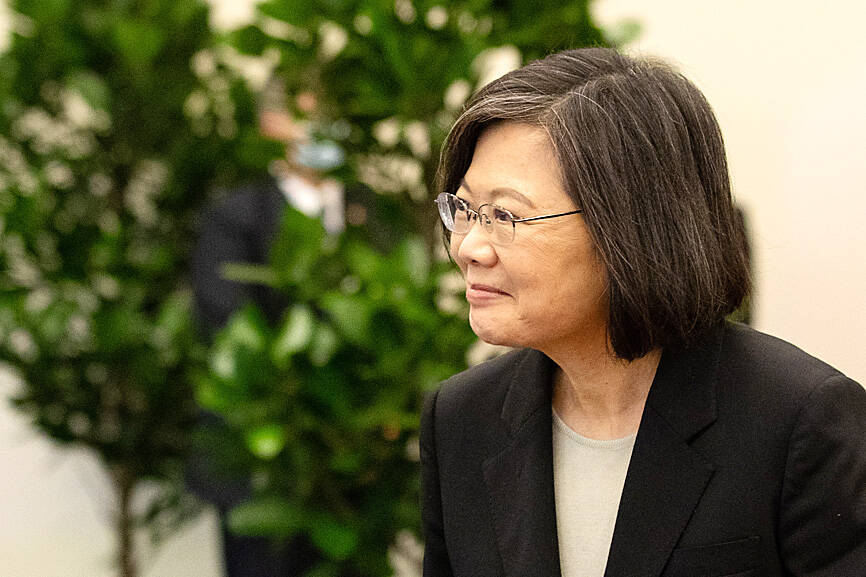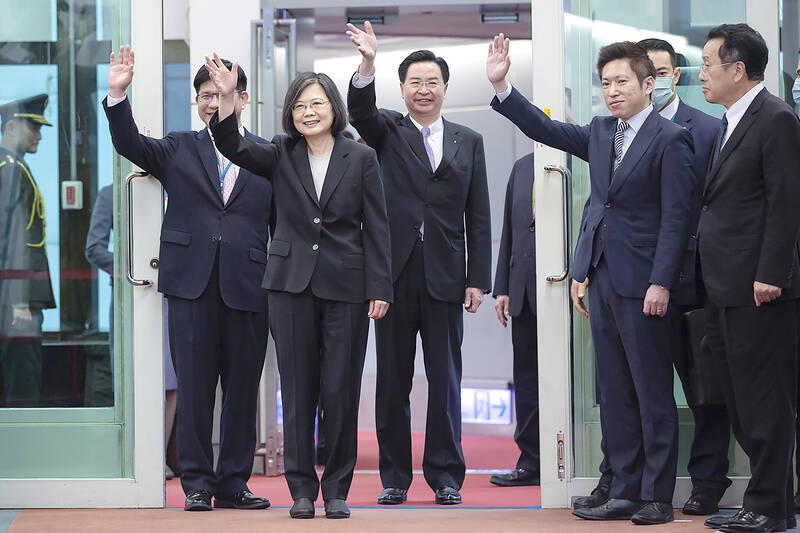President Tsai Ing-wen (蔡英文) yesterday afternoon left Taiwan on a 10-day trip to Central America that includes stopovers in New York and Los Angeles.
“Through this visit, I will express my gratitude to diplomatic partners for their support of Taiwan,” Tsai said at Taiwan Taoyuan International Airport shortly before boarding the plane.
The trip to Guatemala and Belize — her first overseas journey since the COVID-19 pandemic began sweeping around the world in early 2020 — aims to “demonstrate Taiwan’s determination to deepen exchanges” with its Central American allies, she said.

Photo: RITCHIE B. TONGO, EPA-EFE
Tsai said that she and her delegation would also explore the possibility of expanding cooperation with Taiwan’s allies and partners in the areas of agriculture, public health, women’s empowerment, the digital economy and supply chain security.
As Taiwan plays “an indispensable role” in the restructuring of global supply chains, it must work with other countries and contribute to the economic recovery in the post-COVID-19 era, she added.
The presidential delegation would stop over in New York en route to Guatemala and Los Angeles after visiting Belize, the Ministry of Foreign Affairs said.

Photo: Taiwan Presidential Office via AP
Tsai is to arrive in New York at 3am today and spend nearly two days in the city, where she is expected to address an event hosted by the Hudson Institute and receive a “global leadership award” from the think tank.
On her return trip, Tsai is to touch down on Wednesday next week in Los Angeles, where she is expected to meet with US House of Representatives Speaker Kevin McCarthy and deliver a speech at the Ronald Reagan Presidential Library.
The president would be in Guatemala from Saturday to Monday and Belize from Monday to Wednesday, the ministry said.
She is to meet with Guatemalan President Alejandro Giammattei and Belizean Prime Minister John Briceno, as well as Taiwan’s technical missions and expatriates in both countries.
Tsai is to land in Taiwan on Friday next week, although the ministry has not yet announced her arrival time.
Despite a lack of diplomatic relations between Taiwan and the US, Washington has over the years allowed Taiwan’s presidents to make stopovers on US soil during their trips to Latin American and Caribbean nations.
US Department of State spokesperson Vedant Patel said earlier this week that Tsai’s transits in the US are “consistent with longstanding US practice, the unofficial nature of our relations with Taiwan and US policy, which remains unchanged.”
However, China’s Taiwan Affairs Office spokesperson Zhu Fenglian (朱鳳蓮) yesterday told a news briefing in Beijing that Tsai’s stopovers in the US constitute an act of “provocation.”
Beijing would “resolutely fight back” with certain measures should Tsai and McCarthy meet, Zhu said.
The delegation traveling with Tsai consists of Presidential Office Secretary-General Lin Chia-lung (林佳龍), Minister of Foreign Affairs Joseph Wu (吳釗燮) and Deputy Minister of Economic Affairs Chen Chern-chyi (陳正祺), among other officials.
The delegation also includes four legislators: Chen Ou-po (陳歐珀) and Chen Ming-wen (陳明文) of the Democratic Progressive Party, Chiu Chen-yuan (邱臣遠) of the Taiwan People’s Party and Claire Wang (王婉諭) of the New Power Party.

SECURITY: As China is ‘reshaping’ Hong Kong’s population, Taiwan must raise the eligibility threshold for applications from Hong Kongers, Chiu Chui-cheng said When Hong Kong and Macau citizens apply for residency in Taiwan, it would be under a new category that includes a “national security observation period,” Mainland Affairs Council (MAC) Minister Chiu Chui-cheng (邱垂正) said yesterday. President William Lai (賴清德) on March 13 announced 17 strategies to counter China’s aggression toward Taiwan, including incorporating national security considerations into the review process for residency applications from Hong Kong and Macau citizens. The situation in Hong Kong is constantly changing, Chiu said to media yesterday on the sidelines of the Taipei Technology Run hosted by the Taipei Neihu Technology Park Development Association. With

A US Marine Corps regiment equipped with Naval Strike Missiles (NSM) is set to participate in the upcoming Balikatan 25 exercise in the Luzon Strait, marking the system’s first-ever deployment in the Philippines. US and Philippine officials have separately confirmed that the Navy Marine Expeditionary Ship Interdiction System (NMESIS) — the mobile launch platform for the Naval Strike Missile — would take part in the joint exercise. The missiles are being deployed to “a strategic first island chain chokepoint” in the waters between Taiwan proper and the Philippines, US-based Naval News reported. “The Luzon Strait and Bashi Channel represent a critical access

‘FORM OF PROTEST’: The German Institute Taipei said it was ‘shocked’ to see Nazi symbolism used in connection with political aims as it condemned the incident Sung Chien-liang (宋建樑), who led efforts to recall Democratic Progressive Party (DPP) Legislator Lee Kun-cheng (李坤城), was released on bail of NT$80,000 yesterday amid an outcry over a Nazi armband he wore to questioning the night before. Sung arrived at the New Taipei City District Prosecutors’ Office for questioning in a recall petition forgery case on Tuesday night wearing a red armband bearing a swastika, carrying a copy of Adolf Hitler’s Mein Kampf and giving a Nazi salute. Sung left the building at 1:15am without the armband and apparently covering the book with a coat. This is a serious international scandal and Chinese

COUNTERINTELLIGENCE TRAINING: The ministry said 87.5 percent of the apprehended Chinese agents were reported by service members they tried to lure into becoming spies Taiwanese organized crime, illegal money lenders, temples and civic groups are complicit in Beijing’s infiltration of the armed forces, the Ministry of National Defense (MND) said in a report yesterday. Retired service members who had been turned to Beijing’s cause mainly relied on those channels to infiltrate the Taiwanese military, according to the report to be submitted to lawmakers ahead of tomorrow’s hearing on Chinese espionage in the military. Chinese intelligence typically used blackmail, Internet-based communications, bribery or debts to loan sharks to leverage active service personnel to do its bidding, it said. China’s main goals are to collect intelligence, and develop a